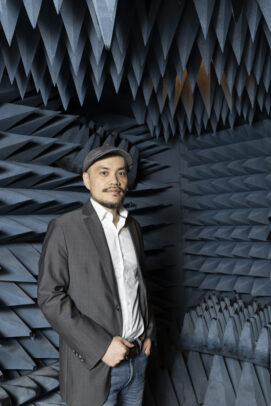Rising Star Award: Pai-Yen Chen, College of Engineering
The world is increasingly wireless, whether it’s the internet connections we rely on daily, the Bluetooth headphones we wear to power our workouts with music or remote sensors in cities to monitor our environment.
But for Pai-Yen Chen, associate professor of electrical and computer engineering, the wireless revolution is just getting started.
Chen’s research group invents technologies with applications for smart cities, telemedicine, renewable energy and other futuristic fields. This involves blending modern approaches and sciences such as nanomaterials, micro- and nano-electromagnetism and quantum-inspired engineering. His innovations include wireless wearable and implantable sensors, uncrackable security systems and antenna designs that allow more powerful and flexible wireless communication.
Growing up in Taiwan, Chen was fascinated by the local semiconductor industry. Later, he worked at Taiwan Semiconductor Research Institute before coming to the United States to earn his doctorate degree. His technological interests broadened during his graduate studies with professor Andrea Alù at the University of Texas at Austin. In one project that attracted global media attention, he helped design an “invisibility cloak” that cancels unwanted electromagnetic scattering and renders objects undetectable.
At UIC, he has borrowed concepts from quantum mechanics to make wireless security systems that use key cards or fobs harder to hack and to create more sensitive sensors. Now he’s working with collaborators to adapt some of these innovations for medical use, creating microdevices that can wirelessly monitor heart rhythms, pressure inside the eye and brain and other important vital signs. In one project, he’s building a thin wearable electronic device that sits on the skin.
“It’s basically a smart tattoo,” Chen said. “It’s breathable and you cannot feel anything on your body, but the sensor can transmit all your vital signs to a data hub via radio waves. Then we can use AI to analyze the results and thus achieve telediagnosis and even teletreatment.”
Other ongoing projects include using nonlinear electromagnetic responses in novel semiconductor devices to generate cryptographic random numbers and designing new photonic chips that use light instead of electrical signals to transmit data. Chen credits the thriving and diverse scientific community in and around Chicago with helping support his work and perpetually inspiring fresh avenues for research.
“At UIC, we are surrounded by a very good academic ecosystem, and this has really helped me a lot,” Chen said. “For me, it is like an incubator. I really enjoy working with my students and my colleagues, who always inspire and motivate me. I feel there are unlimited things to learn and explore in the context of physics and engineering across the full electromagnetic spectrum. It makes me very energetic.”
Read about other recipients of the 2023 Researcher, Scholar and Inventor of the Year awards this week on UIC today, with new profiles posted each day. On April 22, you’ll find coverage on UIC today from the awards ceremony.

